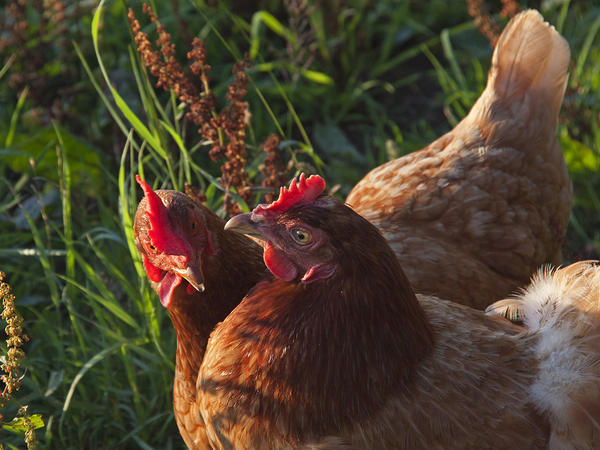 UGA Professor Bruce Webster and research engineer Wayne Daley discussed their study into deciphering the sounds a chicken makes on ''A Closer Look.''
UGA Professor Bruce Webster and research engineer Wayne Daley discussed their study into deciphering the sounds a chicken makes on ''A Closer Look.''
Forget the age-old question about why the chicken crossed the road. Scientists at the Georgia Institute of Technology and the University of Georgia want to know what the chicken said.
UGA and Georgia Tech researchers have been studying the different sounds chickens make and if those sounds might indicate whether the birds are happy or sad, or maybe sick or frightened.
Deciphering the emotional state of the chicken is the central theme of the research by Bruce Webster, a professor with UGA’s Poultry Science Department, and Wayne Daley, a research engineer with Georgia Tech’s Food Processing Technology Division.
They and their research teams have recorded more than 1,000 hours of chicken clucking, screeching, squawking and cooing.
“It’s important in poultry agriculture to be aware of the well-being, the status of a flock at all times,” Webster said on “A Closer Look,” explaining why an understanding of what a chicken might be saying could be critical for farmers.
“The one thing that is largely unexplored is the fact that chickens are very vocal creatures and can indicate their own individual status by the nature of the vocalizations they make,” Webster added.
What they’ve discovered thus far about chicken speak is that these birds’ vocalizations follow a pattern similar to that of people.
“Like human beings, the more emotional or the more excited an animal is, the louder the type of call it makes or the more repeated calling that it makes,” Webster said.
Daley of Georgia Tech said researchers talked to those with the most knowledge of chickens about the sounds the poultry make.
“We started to speak to the people that work in the area and the experts always said ‘I can walk into the houses and tell how the animals are feeling just by listening to them.’”
Webster and Daley wanted to understand those sounds, as well, only they wanted to scientifically document them, too.
They had two objectives in deciding to undertake the study.
“The producers are very concerned about the well-being of the animal,” Daley said. “The other main reason is they perform a lot better, in terms of the efficiency of growth and so on, if you raise them under the proper conditions.”
And ultimately the chickens themselves could tell farmers what the best conditions really are, if farmers could learn their language.

9(MDAxODM0MDY4MDEyMTY4NDA3MzI3YjkzMw004))








